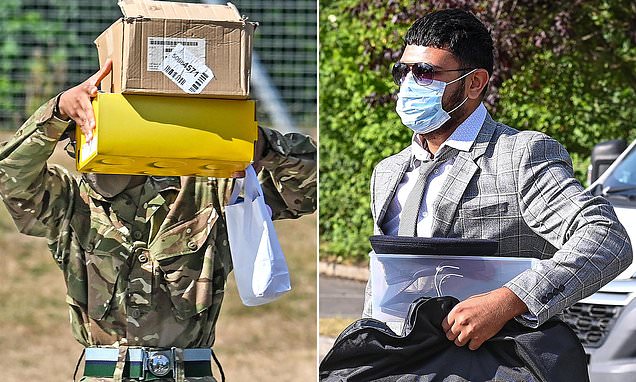In a time when the world was still reeling from the horrific events of the October 7 Hamas attacks in Israel, two British Army soldiers made a decision that would not only end their military careers but also raise serious ethical questions about conduct in uniform.
Rather than showing restraint, they chose to share deeply disturbing footage—some of which depicted extreme violence and apparent war crimes.
Sharing the Unseen—and the Unthinkable
Signallers Zakariya Munir and Mohammed Salah, both serving in the British Army’s 10th Signal Regiment, found themselves at the center of a court martial after circulating graphic videos via private messages.
These were no ordinary clips—they were helmet-cam recordings, believed to have been taken by Hamas militants, showing scenes of brutal killings, desecrated bodies, and horrifying mistreatment of civilians.
The videos were allegedly sent by Munir to Salah just a day after the attacks took place.
With a message reading “you won’t see this in the media,” Munir forwarded footage of corpses being kicked, civilians lying in pools of blood, and a montage that could only be described as chilling.
Salah, a young father, then shared them with other service members.
A Line Crossed in Uniform
The situation escalated further when another video surfaced—this one showing an ISIS-style execution, where a group of men carried out cold-blooded killings of kneeling detainees.
This particular clip was reportedly shared only by Munir, not Salah, but it added weight to the case.
Bulford Military Court heard that these acts weren’t just about curiosity or news-sharing; they were deemed “grossly offensive” and inappropriate for soldiers, especially ones representing the British Army during such sensitive times.
It was emphasized that both had violated not only military standards but also moral boundaries.
Courtroom Fallout and Charges
Both soldiers denied the charges but were ultimately convicted.
Munir faced four counts of sending offensive communications via a public network, while Salah was charged with three.
Their phones were investigated thoroughly, with messages confirming they had been aware of the disturbing nature of the content.
While their legal teams argued mitigating factors—Munir being young and impressionable, and Salah dealing with severe anxiety and prioritizing his family—the judge remained firm in the verdict.
Judge Delivers a Stark Reminder
Judge Advocate General Alan Large didn’t mince words during sentencing.
He pointed out that while talking about current events like the October 7 attacks was not inherently wrong, the decision to forward graphic, violent content clearly crossed the line.
“These were globally significant incidents,” he said.
“The videos you shared were not only graphic but likely captured by those committing serious crimes, even murder.
Sharing them was a violation of everything you are expected to uphold as soldiers.”
He added that the two had ample opportunities to seek guidance, but instead chose to distribute violent material that could have been easily spread beyond their control.
Consequences Beyond the Courtroom
In the end, both soldiers were dismissed from service.
Munir had joined the army in 2021, and Salah had been enlisted since 2019.
Their military careers, which might have held promise, ended over a few taps on a phone screen.
Their actions not only cost them their positions but also sparked wider questions about how soldiers handle sensitive content, especially in today’s digital age where lines between reporting, curiosity, and exploitation can easily blur.
